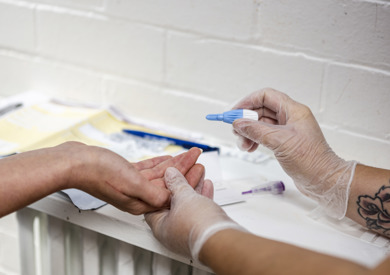Blood borne virus (BBV) tests
The blood borne viruses we test for are Hepatitis B, Hepatitis C and Human Immunodeficiency Virus (HIV). If you attend one of our drug or alcohol services, you will be offered a free BBV test. You can also ask for a test when you register with a service.

What BBVs are and why we test for them
Blood borne viruses (BBVs) are viruses that spread through blood, and in some cases, bodily fluids.
BBVs don’t always have obvious symptoms. There’s no way of knowing whether you have a BBV unless you get tested - even if you don’t think you’ve been at risk lately.
Types of BBVs
The blood borne viruses we test for are:
Hepatitis C is a virus that can impact the liver, and is spread through blood-to-blood contact or bodily fluids.
There's no vaccine for hepatitis C, but there are ways to prevent the virus, such as not sharing drug injecting equipment, razors, toothbrushes and needles.
Hepatitis B is a liver infection that is spread through blood, semen and vaginal fluids.
Vaccination is the best way to prevent hepatitis B. Using a condom when having any type of sex, and not sharing drug-injecting equipment, razors, toothbrushes and needles also helps to prevent the virus.
HIV is a virus that damages the cells in the body’s immune system.
You can help prevent HIV by using a condom during any type of sex, post-exposure prophylaxis and pre-exposure prophylaxis (see more information below), antiretroviral medicines and not sharing drug injecting equipment, razors, toothbrushes and needles.
Pre-exposure prophylaxis (PrEP)
PrEP (pre-exposure prophylaxis) can reduce your chance of getting HIV from sex or injecting drugs. When taken as prescribed, PrEP is highly effective at preventing HIV. PrEP does not protect you against BBVs such as Hep B and Hep C
It’s important to remember that condoms are still the most effective method of preventing BBVs, HIV and other sexually transmitted infections (STIs).
Post exposure prophylaxis (PEP)
PEP can be used after potential exposure to HIV, to reduce the risk of HIV infection.
PEP can prevent you from becoming infected with HIV if you start taking it within 72 hours from the time of exposure, so getting quick access is vital. PEP is available from sexual health clinics and at some hospital’s accident and emergency departments (A&E).
Why you might need a BBV test
We encourage all of our clients to have a BBV test, regardless of whether you currently inject drugs or have done in the past. You can be vulnerable to BBVs for a variety of reasons, including sharing razors and toothbrushes.
Things that can put you at increased risk of BBVs include:
-
having sex without a condom
-
current drug use or a history of drug use
-
having received a blood transfusion or blood products before 1991
-
having tattoos or medical procedures in unhygienic circumstances
What the free BBV test involves
We test for BBVs using a process called dried blood spot testing. This is a really simple process that doesn’t involve drawing a syringe of blood or any other kind of medical procedure.
- The person giving you the test will gently prick your finger, then collect a small drop of blood on a piece of card.
- They will then clean your finger and give you a plaster.
- The card with your dried blood spot will be sent away for testing, and you’ll usually get your results within 10 days.
You do not have to pay for this test.
What happens after a BBV test
If you test positive, we’ll let you know. With your consent, we’ll refer you to a local clinic for treatment.
To treat hepatitis C, you’ll be given tablets called direct acting antivirals that attack the hepatitis C virus. Most people find this treatment easy to take, with little to no side effects. It’s available to everyone, even if you’re still using alcohol or drugs.
The tablets will be prescribed through a local clinic. They will arrange for your medicine to be delivered to you.
You’ll need to take the tablets for about eight to twelve weeks. Then you’ll need to wait another 12 weeks before having another test to see if the treatment has worked.
In more than 95% of cases, you will be cured of hepatitis C. If the treatment hasn’t worked, it may be repeated or extended. You could also be given a different kind of treatment. The clinic will discuss this with you.
The treatment process depends on how long you’ve had the virus for:
-
Short-term (acute) hepatitis B does not usually need specific treatment, but may need treatment to relieve the symptoms
-
Long-term (chronic) hepatitis B is often treated with medication to keep the virus under control
There’s currently no cure for HIV, but antiretroviral medicines - also known as ART - can help you to live longer and healthier lives. They also help to reduce HIV transmission.
ART involves taking a mixture of different medicines (which may be combined into a single pill) every day. It works by stopping the virus replicating in the body, which enables your immune system to repair itself and prevent further damage.
ART reduces the amount of HIV virus in your blood (viral load). After a period of time, ART will lower your viral load to an undetectable level, which means that there is effectively no risk of transmitting HIV.

Self-help information and advice
If you would like to find out more about how to stay safe and healthy, we have a range of self help resources that can support you on your journey.
